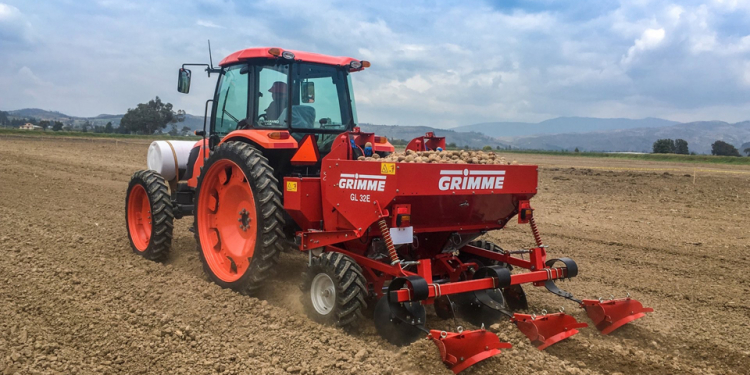Frank Nordmann, General Manager Key Accounts and Sustainable Development at GRIMME Landmaschinenfabrik, in conversation with Michael Monnerjahn from Germany Trade & Invest
The Lower Saxony agricultural machinery manufacturer GRIMME builds and sells potato, beet and vegetable technology in more than 120 countries worldwide – including a dozen in Africa. Especially in demand there are simple machines for harvesting potatoes. Free representatives and local traders play a major role in the company’s Africa business. Further insights into the special features of African markets can be found in the interview.
PRESENT ON SITE WITH LOCAL DEALERS
Mr Nordmann, how long and where has Grimme been active in Africa?
Frank Nordmann, General Manager Key Accounts and Sustainable Development at GRIMME Landmaschinenfabrik
In 1996, we initially established branches in Egypt and South Africa. Since 2011, we have been active in the other African markets – there are now a total of twelve other countries. These include Algeria and Morocco in North Africa, Kenya and Tanzania in East Africa, Senegal in West Africa and Zambia and Zimbabwe in Southern Africa.
How do you proceed in Africa?
In South Africa we have our own office with an employee as well as a local dealer. In the other countries, on the other hand, we work together with free representatives and/or dealers who are anchored locally. The dealers we work with also sell other products that complement our Grimme products – tractors, but also construction machinery.
What role does the African market play for Grimme?
To date, Africa has only accounted for a relatively small share of the company’s total turnover. However, between 2011 and 2016, we experienced strong growth in the different regions of the continent. In the past, however, there have always been events that have slowed down the positive developments in the meantime. In 2016 and 2017, these were the drought phases and most recently the corona pandemic.
SIMPLE MACHINES PAY OFF
Why do African customers buy agricultural machinery from Germany?
Our customers in Africa can use the machines to generate added value and ultimately higher profit. They rely more on simple machines. Certain functions that are in demand in developed markets, such as washing or packaging, are generally less in demand in Africa. However, this varies depending on the country.
If the wage in a country exceeds about ten US dollars a day, then our machines pay off. The higher the standard of a market, the more interesting the market is for us and for mechanization in general. With its numerous supermarkets, South Africa is the most developed market on the continent.
Are the customers from Africa different from your customers in other regions?
As in Europe or in the USA, we try to build the best possible partnership with farmers. There are 54 countries in Africa, and each country is different. You have to adapt to the mentality. During the corona pandemic, we benefited from the fact that we were able to continue working relatively well with our local partners in many countries. However, where we are not represented, it is currently difficult to communicate with customers and do business. Personal contact is important in our industry.
What challenges are there in your business activities in Africa?
Payment transactions and the availability of foreign currency are problematic in some countries such as Ethiopia or Angola. Fluctuating demand is a challenge for our customers in smaller markets. It makes continuous and sustainable cultivation difficult. In addition, there is the difficulty of finding partners who are able to guarantee a complete after-sales service throughout the entire cultivation period.







